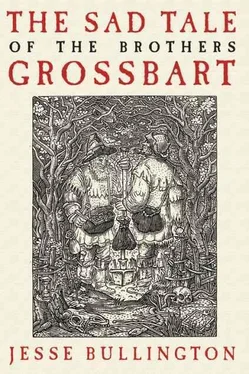In the days that followed the pain in Hegel’s leg worsened, as did his attitude. Manfried’s attempts to figure where this new monstrosity fit into their growing catalogue went unanswered by his limping brother. Hegel stole the Arab’s crutch but even with a peg leg and no assistance Al-Gassur moved quicker than he. Huts could sometimes be dimly seen on the opposite bank but no men called to them and they knew better than to attempt a crossing. When Hegel felt the old itching at his neck he turned and saw a large ship creeping up the river behind them. They all stopped, agreeing they had no choice but to hail the galley.
“Now remember, Arab,” Hegel cautioned, “you’s the only one can speak like them, so be sure the meanin’s clear. They take us to the tombs and they get some gold but not a coin fore then.”
“Of course, my kin in lame.” Al-Gassur bowed.
“And recollect right what happened to every cunt what tried doin us wrong or sellin us out,” Manfried added.
“What if they attack us?” Martyn worried his lip.
“Then we strike them down with the power of the Lord.” Moritz drew his massive sword, raising himself in the Grossbarts’ estimation.
“And if they don’t stop, but row past us?” Martyn insisted something must go wrong.
“That is reason Her Goodness Mary grant our ownselves crossbows,” Raphael said, lying in the mud to notch a bolt.
“Finally in decent company,” Hegel told his brother in their twinspeak.
“Close’s we’s liable to get, any rate.” Manfried also cocked his arbalest, switching back to German. “Here they come, so do your stuff, Arab!”
They began jumping in the muck, yelling and waving their hands, even Rodrigo excited by the prospect of escaping the swamp. The boat slowed, the bearded men at the oars staring at them in shock, those striding on the deck excitedly yelling. Al-Gassur invented word after nonsensical word, tears of pleasure at the Grossbarts’ imminent undoing cleaning his mustache.
The rowers at the front locked their oars and stood as the boat glided toward the shore. The standing men withdrew bottles, knocked them back themselves, and tossed them to the rejoicing men on the bank. Nothing is less cautious than a fiending alcoholic, only Moritz abstaining from the drink. Yet when Hegel tilted a gifted bottle that old witch-chill rushed up and down his bones, his belly twisting around his spine. He slapped a bottle out of Manfried’s hand and drew his pick.
“I don’t believe them boys was actually drinkin, brother. Drink’s probably got some Arab barber berries in it or such, so lest you’s eager to wake up in some new place with all sorts a nasty to deal with I’d abstain.”
“I’s had enough a that shit to last a lifetime,” said Manfried, firing his crossbow into the first Mamluk to hit the bank, and together they joined the fiercest, greatest battle of their lives.
XXVIII. The Rapturous Hunt
The winter ended as Heinrich’s new family journeyed, the heat increasing even in the dank belly of the southern forests of Wallachia. Over hills and rocky mounts, through sunny glens and shadowy gulches they crept, never doubting their purpose. Vittorio talked incessantly while Paolo had not spoken since he recognized the grotesque buboes bulging under Heinrich’s arms when the man removed his robes to pop blisters and peel skin, depositing them in a river upstream of a mill. Paolo had certainly become mad as a mooncalf but his education stayed with him. Only when Vittorio scratched at his groin and armpits did the barber’s son inspect his own, and at seeing the purple swellings he rejoiced to know he would soon die. He did not, nor did Vittorio, nor did Heinrich.
When they skirted the massive city of Al-Gassur ’s birth Heinrich danced lewdly by moonlight, reciting litanies inspired by the whispers he heard not in his ear but in his heart. Drawing symbols in the dirt with a woodsman’s severed finger, Heinrich repeated the words that freed similar beings from their torment, granting Paolo and Vittorio the same privilege he enjoyed.
Crossing the channel proved nigh impossible with the three demoniacs’ aversion to running water but they managed to steal a boat and float across without dampening themselves. They were almost apprehended by mounted Turks several times in the barren regions they crossed, but they hid in caves when the numbers were too great and descended on smaller groups, again devouring all but one or two, leaving those to stagger home, infecting their loved ones and ranting the cursed name Grossbart that all three of the possessed chanted hatefully.
Into the wastes, those born men now appeared barely more human than the twins, both of whom had grown to the height of horses from constant feeding. Their buboes big as the honey-melons so loved in those regions, their pace weakened but their intent did not, Vittorio and Paolo eagerly following their brothers into combat with men who shrieked and fled at their approach. Their guts sagged with black and yellow biles, the humours churning but refusing to burst from their copious sores and wounds so that they were able to drain them only into the pleading mouths of their victims. Any oases they traversed rotted to desert at their presence, and for months they ate only men; all other creatures smelled their evil from great distances and could not be caught even by the twins.
The things inside them communed while their hosts slept, delighting in the willingness of their servants and bartering with their still-imprisoned kin for information regarding the Grossbarts. Those without form could do naught but enviously watch, but the two released into the Italians had dutifully scoured with sight not constrained by space before being granted their salvation. They were very close indeed; fortunate, for the oppressive heat that cooked them even as the seasons changed threatened to slay their mounts before they captured their game, and in such desolate regions they might not find replacements before being thrust back into the place they had so vigorously fled.
XXIX. Like the End, the Beginning of Winter Is Difficult to Gauge in the South
Outnumbered five to one, and with Cardinal Martyn and Al-Gassur swooning from the soporific-laden wine, the Grossbarts may well have met their end there on the bank of the Nile had chance not favored them. The impressed men working the oars of that particular galley were prisoners and not birth-slaves, and just as their Mamluk masters had once spurned their bondage and usurped their keepers, so too did these slaves revolt upon witnessing the Grossbarts’ resistance. Chained in place though they were, these wretches thrust their oars and feet before the charging legs of their masters, slowing the Mamluks attempting to join the fight and winning the day-a boon that none of the victorious Europeans would ever acknowledge.
When the last Mamluk contributed his lifeblood to the ruddy fluids of the Nile, the Grossbarts took stock of how the battle had gone. They now had a boat and slaves, and despite the odds only Moritz-the last remaining Hospitaller-had expired from his wounds, a long handle jutting ominously out from between the felled man’s helm and breastplate. Raphael had seen enough carnage in his days with the White Company to know that he too would doubtless join the slain knight before the sun set, for in addition to the pommel that had smashed most of his teeth, his left wrist had caught a blade that nearly severed his hand. Spitting gore and tooth-gravel, he desperately attempted to stanch the wound even as his legs gave out.
While Martyn and Al-Gassur were rolling in the sand and vomiting from their poisoned beverage, the battle seemed to have restored the melancholic Rodrigo to a more chipper mood. He actually laughed periodically as he made the rounds, shoving his sword repeatedly into the prone figures of their attackers. Manfried noticed Raphael’s mortal condition at the same time the still-chained-in-place and now-screaming slaves drew Hegel’s attention to the fact that the last Mamluk had destroyed the rear of the rapidly filling galley. Knowing they could not possibly remove all of the boat’s supplies before it sank, Hegel begrudgingly used a key he had found on the body of the lead Mamluk to free the slaves and enlist their assistance. Not only were the supplies rescued but the slaves were able to haul the prow farther onto the bank, meaning the vessel could be repaired.
Читать дальше












